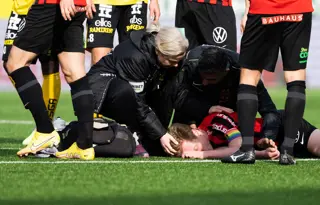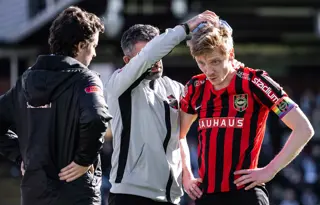Player Op-Ed
“What I learned after suffering five concussions in one season” – Gustav Sandberg Magnusson

About the author
Gustav Sandberg Magnusson is a former Swedish footballer who played for IF Brommapojkarna for most of his career. In the 2024 season he suffered five concussions, forcing him into early retirement. The former defensive midfielder, who now works as a director at his former club, reflects on his concussions a year on from his retirement.
By Gustav Sandberg Magnusson
I suffered five concussions in my final season as a player. It turned out to be an unacceptable amount in such a short timeframe and I had to retire from playing. I’ve asked myself so many times if there’s something I could have done differently, if there was a way these injuries could have been avoided. I don’t think I have an answer.
I’ve always had a rough playing style. I go for everything 100 percent and I guess that makes me more susceptible to a concussion than others. But five? You’d be unlucky to tally that amount in a season even in rugby or American football…
When I suffered my last concussion, I knew something wasn’t right. I didn’t feel good. All I could do was lie in a darkened room. I couldn’t even go to the playground with my kids.

In a football context, 33 is quite old. But as a person and a father, I had so much time ahead of me and I wanted to feel fit and healthy for as much of it as possible. When three doctors advised me to stop playing, it was tough to hear. But they were telling me something I already knew: it was time to hang up the boots. In the end, it was a relief not to have to make that decision on my own.
The player union helped me a lot at this point in my life and made sure that I had someone to talk to; someone outside of football, and outside of my family. It helped me unload and come to terms with the decision.
I still have a scar from last season’s first concussion. It was a bad one. I don’t have any memory of the incident, and it was only when I looked back at the video that I saw what had happened and it was a hard knock.
The rehab served as a ladder to recovery. First, you have to lie in a dark room until you have no symptoms. Then you can go for a walk, then you can practice with the ball and so on. You can only move forward when you are completely ready. Then, you suddenly find yourself on the pitch again.
The recovery time was different with each concussion. After the second one I was back playing after a week. The only problem was that a third concussion followed just three games in.
They were now coming much closer together than before. By the fourth concussion I was scared. Like with the first three, I had no memory of the event and had to watch it back to see what had happened. Unlike the first three, though, it wasn’t a big hit. It didn’t look like it should have knocked me out the way it did; it was just a light touch on the head and it was enough for me to lose my memory. It was as though my tolerance had decreased.
While I was aware of the risks of concussions, at the time I didn’t understand just how much worse it could be the more you suffered them. It’s not as though I didn’t have them before when I was younger; I likely suffered a handful up until that point, but I was never sure and so I didn’t look too much into it.
There is always going to be some element of danger when playing elite sports. Your whole body is open to injury and there’s no way to totally eliminate that. While I have no personal experience with new technologies, there are things available now that are definitely worth trying to see if we can improve player safety. We need to start somewhere to minimise the risks as much as possible.
I think the concept of a 10-minute concussion review is a great step to take, as it gives doctors the time they need to assess the situation and not take any risks. In my case, the doctors forced me off the pitch each time, and I’m grateful that the power lay with them – it was the right decision.
It should never be up to the player or coaches because you can’t be truly objective in that situation. Players want to win games and you’ll do anything to do that, even if it means continuing when you shouldn’t. It’s also difficult for players to make a sound judgement on how serious the injury is at that point in time.

A year ago, if I saw a ball flying towards my head, I would head it without even thinking. It was instinct. Now, I wouldn’t dream about letting it touch my head.
Physically, I’m fine now. I got out at the right time, but my experiences have left an impact on me. It’s the little things, such as my seven-year-old climbing on my back which makes me immediately move my head out of the way, like I’m subconsciously avoiding any possible chance of it happening again.
There’s not much advice I can give to other players that I would take if I were in their shoes. I can’t tell you to go easy on the pitch because that would be wrong. I can’t tell you to hang up your boots like me because had I been ten years younger, I’m not sure I could’ve brought myself to make the same decision. All I can say is that you’ve got a long life to live after football, so make sure you leave the game with every capacity to make the most of it.
